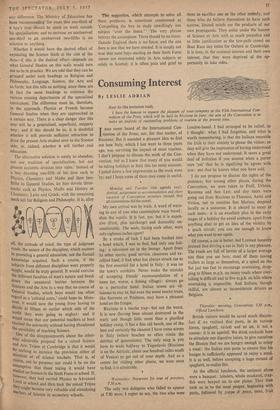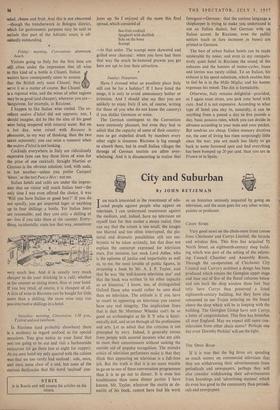Consuming Interest
By LESLIE ADRIAN Dear Sir (the invitation read), I have the honour to request the pleasure of your company at the I/1th International Con-
vention of the Press, which will be held in Riccione in June: the aim of the Convention is to make an analysis of outstanding problems of tourism at the present time.
T HAD never heard of the International Con- ivention of the Press; nor, for that matter, of Riccione. But it sounded a pleasant idea to find out how Italy, which I last went to three years ago, was surviving the impact of mass tourism. I don't propose to discuss the work of the Con- vention; but as I knew that many of you would be taking holidays in Italy this (or next) summer, I jotted down a few impressions as the week went by; and I hope some of them may come in useful.
Monday and Tuesday (the agenda ran): Arrival, assignment to accommodation and short vacation of Convention members (would that all conventions did the same).
My own arrival was by train. A word of warn- ing to any of you who contemplate train travel : shun the rapido. It is fast, yes; but it is expen- sive (First, plus surcharge) and damnably un- comfortable. The seats, facing each other, were only eighteen inches apart !
By a stroke of luck 1 had been booked into a hotel which, I was to find, had only one fail- ing: a television set in the lounge. Apart from its other merits, good service, cleanness and ex- cellent food, it had what has always struck me as the first essential for a hotel in Italy : it was on the town's outskirts. Never make the mistake of accepting friends' recommendation of a town (or, worse, a fishing village): always go to a particular hotel. Italian towns are vil- lainous to stay in, but even the worst tourist traps, like Sorrento or Positano, may have a pleasant hotel on the fringes.
Riccione is a tourist trap—but not the worst. It is new (having been almost destroyed in the war); and though little more than a glorified holiday camp, it has a fine old beach, one of the best and certainly the cleanest I have come across in Italy (where beaches so often retain the detritus of generations). The only snag is you have to wade halfway to Yugoslavia (Riccione is on the Adriatic, about one hundred miles south of Venice) to get out of your depth. And as a centre for visiting other places, we were soon to find, it is admirable.
* Wednesday: Departure for tour of province, 7.30 a.m.
The only two delegates who failed to appear at 7.30 Were, I regret to say, the two who were London-based. I had arranged to be called, as I thought : what I had forgotten, and what is worth remembering, is that the Italians resemble the Irish in their anxiety to please the visitor; so they will give the impression of having understood when they have not understood. It saves a great deal of irritation if you assume when a porter says 'yes' that he is signifying he agrees with you : not that he knows what you have said.
I do not propose to discuss the sights of the province; but among other places, during the Convention, we were taken to Forli, Urbino, Ravenna and San Leo; and day tours were going out from Riccione to Florence, Assisi and Venice, not to mention San Marino, despised locally as a nonsense. It is absurd to sneer at such tours : it is an excellent plan in the early stages of a holiday (to avoid sunburn, apart from anything else) to get an idea of the vicinity by a quick circuit; you can see enough to know what you want to see again.
Of course, a car is better; but I cannot honestly pretend that driving a car in Italy is any pleasure. The roads are full of lorries of a larger average size than you see here, most of them towing trailers as large as themselves, at a speed on the fiat just too fast to encourage overtaking, drop- ping to fifteen m.p.h. on twisty roads where over- taking is difficult and to five m.p.h. on hills where overtaking is impossible. And Italians, though skilful, are almost as inconsiderate drivers as Belgians.
* Thursday: morning, Convention; 1.30 p.m., Official Luncheon.
British visitors would be saved much discom- fort if we realised that pasta, in its various forms, spaghetti, ravioli and so on, is not a course : it is an aperitif. We drink cocktails here to stimulate our digestive juices, to give ourselves the illusion that we are hungry enough to enjoy a meal : the Italian eats pasta to ensure that his hunger is sufficiently appeased to enjoy a meal. It is as well, before accepting a huge mound of spaghetti, to realise this.
At the official luncheon, the antipasti alone were a banquet : lobsters, whole mackerel, cray- fish were heaped on to our plates. They then took us in to the meal proper, beginning with pasta, followed by zuppa di pesce, meat, fruit salad, cheese and fruit. And this is not abnormal —though the trencherwork in Bologna district, which for gastronomic purposes may be said to include that part of the Adriatic coast, is ad- mittedly outstanding.
Friday: morning, Convention; afternoon, beach.
Visitors going to Italy for the first time are still often under the impression that all wine in this kind of a bottle is Chianti. Italian waiters have consequently come to assume that the British only want Chianti; they serve it as a matter of course. But Chianti is a regional wine, and the wines of other regions may be as good (and cheaper), wherever you are- Sangiovese, for example, in Riccione.
I happen to like Italian wine cooled. The ex- cellent maitre d'hôtel did not approve; nor, I should imagine, did he like the idea of his good wine being tempered with mineral water. But on a hot day, wine mixed with Recoaro is pleasanter, to my way of thinking, than the two taken separately; you can seize a moment when the maitre d'hôtel is not looking.
Cocktails everywhere in Italy are ridiculously expensive (you can buy three litres of wine for the price of one cocktail). Straight Martini or Cinzano is the obvious solution; iced, with soda, in hot weather—unless you prefer Campari `bitter,' or the tart Punt e Mes: not me.
Italian hotels and caMs are under the impres- sion that no visitor will touch Italian beer—the only time I was even offered the choice, it was Will you have Italian or good beer?' If you do not specify, you get imported lager at anything up to four shillings a bottle. Yet Italian beers are reasonable; and they cost only a shilling or so—less if you take them at the counter. Every- thing, incidentally, costs less that way, sometimes very much less. And it is usually very much cheaper to do your drinking in a café, whether at the counter or sitting down, than at your hotel. If you buy retail, of course, it is cheapest of all. A litre of wine in Riccione can be bought for little more than a shilling; the same wine may run you into twelve shillings in a hotel.
* Saturday: morning, Convention; 1.30 p.m., Typical seafood luncheon.
In Riccione (and probably elsewhere) there is a tendency to regard seafood as for special occasions. You give notice to your hotel that you are going to be out and visit a harbourside restaurant (or go there late at night for supper). At my own hotel my only quarrel with the cuisine was that we too rarely had seafood : sole, once, and once some class of a cod, but none of the curious declicacies that the word 'seafood' con- jures up. So I enjoyed all the more this final spread, which consisted of Sea-fruit cocktail Spaghetti with shellfish Sole on the bone Scampi —in that order. The scampi were skewered and grilled over charcoal : when you have had them that way the much be-battered prawns you get here are apt to lose theirs attraction.
* Sunday: Departure.
Have I stressed what an excellent place Italy still can be for a holiday? If I have listed the snags, it is only to avoid unnecessary bother or irritation. And I should also say that you .are unlikely to enjoy Italy (I am, of course, writing for those of you who do not know the country) if you dislike Germans or noise.
The German contingent to the Convention were extremely pleasant, but even they had to admit that the capacity of some of their country- men to get stupefied drunk by numbers every other night is tiresome. Riccione is big enough to absorb them, but in small Italian villages the throngs of German tourists are often over- whelming. And it is disconcerting to realise that foreigner=German : that the curious language a shopkeeper is trying to make you understand is not an Italian dialect, but German with an Italian accent. In Riccione, even the public notices (such as fare increases in buses) are printed in German.
The best of urban Italian hotels can be made intolerable by noise; and even in my compara- tively quiet hotel in Riccione the sound of the exhausts and the hooters of motor-cycles, buses and lorries was rarely stilled. To an Italian, his exhaust is his speed substitute, which enables him to feel he is in the Mille Miglia; and his hooter expresses his mood: The din is formidable.
Otherwise, Italy remains delightful—provided, as I again must stress, you pick your hotel with care. And it is not expensive. According to what type of hotel you stay in, naturally, it can be anything from a pound a day to five pounds a day, basic pension rates, which you can decide in advance according to your taste and your pocket. But sundries are cheap. Unless memory deceives me, the cost of living has risen surprisingly little since the war; you are much less likely to go back to some favoured spot and find everything has been bumped up 20 per cent. than you are in France or in Spain.















































 Previous page
Previous page